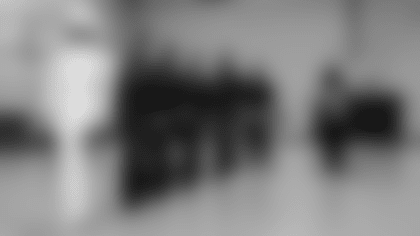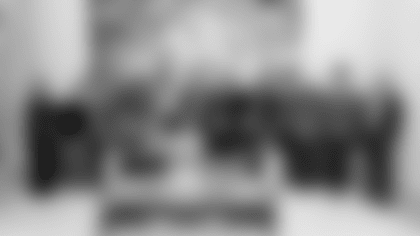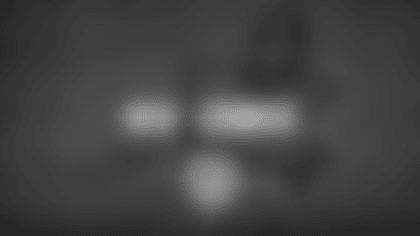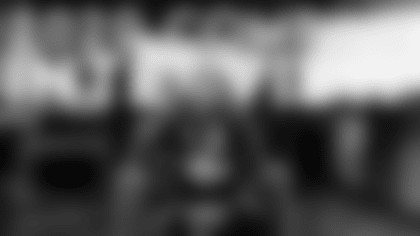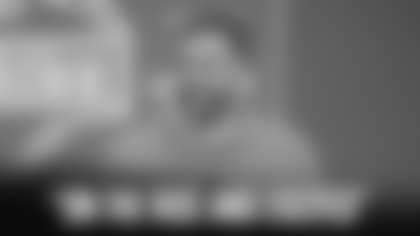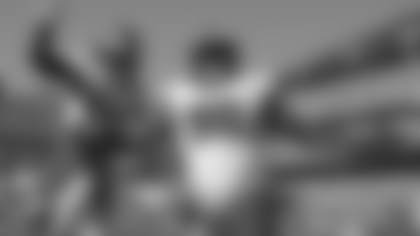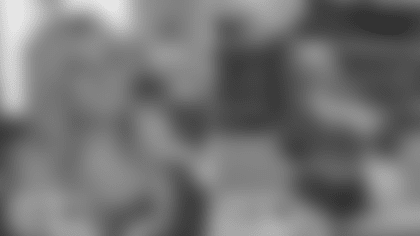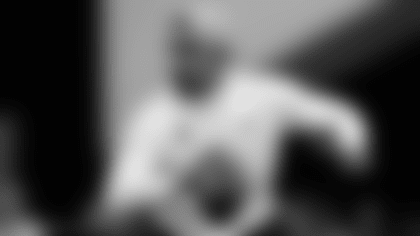* Q. Did you think about taking out CB Bradley Fletcher on Sunday night?*
COACH DAVIS: No I did not.
Q. Is there any scenario that you could imagine sitting Fletcher?
COACH DAVIS: I believe in our guys. I believe in the players we have out there. If you look at the plays we got beat on, he didn't make the play at the ball. On the first one, he got a bad start; he looked back too early. There are different reasons for every one of them, but no I did not.
At the end of the game I switched [the sides] and put Cary [CB Cary Williams] over and matched him up. But I didn't take [Fletcher] out of the game. We've come a long way, it's been a long season, there's been ups and downs. Part of it is hanging together as a team and fighting through slumps.
Every player has slumps and runs where they're really playing well. I think part of being a team and a collective group – there are only four corners that are active at the time and Nolan [CB Nolan Carroll II] has a big role in the dime and Boyk [CB Brandon Boykin] has one in the nickel.
Once you start making those changes, it trickles out there. If he was completely busting coverages, getting beat and getting turned around [it might be different], but that wasn't the case. There were some damn good throws being made on him and yeah, there were three of them. That's a lot and that's why I made the switch to match up the others.
I have faith in Fletch even though he didn't have a good game.
* Q. Hindsight is 20/20, but looking back at the film do you wish you did a little more to help Fletcher a little earlier?*
COACH DAVIS: On almost half the snaps I had doubles on 88 -- doubles on Dez [WR Dez Bryant] – and early on you saw Witten [TE Jason Witten] getting the balls. In calling the game, you're constantly moving between five‑man pressure, or six‑man pressure, or doubling on a receiver. You can't do it all on the same call, so you have to choose where you're giving help: whether it's help to the rush and the pressure on the quarterback, or whether it's help on doubling a receiver or bracketing a receiver.
I'll give [QB Tony] Romo credit, when [Bryant] was doubled and we had the two on him, he went to his other receivers. When we had the help or the pressure somewhere else, he went out to Dez.
I think the biggest difference in the two games that we had -- we stopped the run I believe equally well because there were a lot of shots on goal with 40 run attempts -- but it was the play of Tony Romo and the throws. The throws on Thanksgiving were under-thrown and bad, and we were coming back and making plays. The throws the other night were on the money, and they were right where they needed to be.
* Q. You mentioned that Carroll does a lot for you in dime. If needed, could Fletcher play that role and does he practice it?*
COACH DAVIS: No, no he cannot. Nolan and Boykin can go out, but Cary and Fletch aren't trained to go in. It's a long process to get those guys trained in there and it's got a lot to do with leverage and help and it happens a little bit quicker. The guys are quicker in there. It's a completely different role, and, no, they're not trained.
* Q. I'm sure you've racked your brain over this issue over the last couple of days. Was there any point where you said to yourself that maybe you should have Williams shadow Bryant and move him to the left side?*
COACH DAVIS: There was that point in the fourth quarter. Now should I have done it earlier? When you look at the two games we played last year and you watch Fletch and Cary matched up on Dez, [also] the game on Thanksgiving, there was no reason to say either one of them would do better or worse than the other because they both had plays against Dez made on them and they have also made plays on him.
So to start the game, no, and I really believe that --
* Q. What about during the course of the game? At some point did you think about it before the fourth quarter at all?*
COACH DAVIS: No. When I thought about it, I did it. Again, there's a lot of moving parts and a lot of things going through your head. When you see a great throw and catch made, a lot of times that doesn't trigger you to say, 'Oh that guy is really struggling.' It's when you see really poor technique involved in that same play that you say it. One of them was really poor technique and one of them was really a great throw.
So no, not until the fourth quarter.
* Q. What happened when Boykin abandoned slot coverage late in the game?*
COACH DAVIS: We had zone coverage there and he expanded too quick. It really was. He's got a read [and] if the vertical happens, then he expands. What felt like a vertical to him, wasn't a vertical; it actually sat down. Part of that is my coaching on that technique. He left it too quick is all that happened there.
* Q. Did you blitz more Sunday than you did in the first Dallas game?*
COACH DAVIS: It was actually about the same, but the blitzes kept going out to Dez and turning into touchdowns, so I backed off the blitz a little bit and went to the four‑man rush to put the extra coverage out there as we went on.
Pressure was part of the plan going in, but Tony did a nice job of getting the ball out and hurting our pressures.
* Q. When you were in single-high, do you think your safety rotated fast enough to Bryant's side or cheated that way? Should he have been doing that?*
COACH DAVIS: No, because he was looked off. Again, that's what good quarterbacks do: he saw the single, he saw the pressure, he looked away, and then he threw the vertical.
We did a lot of disguising of single-high and split-safety, and when we were doubling and when we weren't, knowing that you have a quarterback that can diagnose all that. The guys did a nice job of executing our disguises. At the end of the day, I have to take my hat off to the execution they had and the way he placed the ball and threw the ball. At the end of the day, they were better than us on that Sunday.
* Q. One Dallas' first drive, Witten had three catches for first downs. S Malcom Jenkins was right on him on one of them, but what happened on the other two?*
COACH DAVIS: We had an in‑and‑out going on and [WR Cole] Beasley -- they stacked. They really did a nice job of attacking the tool we were using. An in‑and‑out means the first guy in, one guy has, and the first guy out, the other guy has. Well they stacked and they went up field with the stack, which makes it a little cloudy. Then they both broke the leverage and they got us on that one. We just switched our tools later on and it didn't hurt us again.
That's part of the game within the game that we're doing. I really am excited about the way our secondary, from last year to this year, really understands those tools. We knew we got beat on that tool. They had a better call than we had on that tool, but then we went to switching those tools and later on that very same pattern didn't hurt us.
* Q. You're getting a terrific amount of production from DE Vinny Curry relative to the number of snaps he's on the field. Do you view his sack numbers as a function of when you are using him and how often you are using him as opposed to keeping him on the field more and asking him to do more things?*
COACH DAVIS: You have to be very careful when you talk about sacks per snap. I love Vinny; Vinny has been outstanding for us. Do not misinterpret this. We have a lot of guys that go in on run downs and if you take them to that same judgment you're making about, 'This guy is way better than the other guy.'
We put Vinny in on very obvious passing situations and we try to make calls to help Vinny win, and our guys win. He's doing a great job of getting those sacks.
If you increased his number, it's really just increasing the number of times he's playing the run, and he's getting a lot better at that, but his sack numbers I don't think would change. I really don't.
* Q. Do you expect to have LB Trent Cole this Saturday?*
COACH DAVIS: There's still some decisions that have to go on in Trent's camp. I don't think so. I don't know for sure. I think he'll be back the next week if he's not in this week.
* Q. What is your comfort level with LB Brandon Graham starting in Cole's place and LB Bryan Braman as the backup there?*
COACH DAVIS: We have the utmost confidence in B.G. and his ability to go in there. He plays 25-30 snaps a game and he is doing a great job with it. Our rotation will be a little more limited; Marcus [LB Marcus Smith II] will go back to another role as an outside backer. We'll still cross-train him [at ILB and OLB], but he'll get the practice reps, so we can dust off some of his outside linebacker stuff. He can be used either way, which is a benefit that we picked up by cross‑training him. We have confidence in Bryan also.
* Q. As you prepare for Washington, how difficult is it to get tendencies on QB Robert Griffin III since they have changed quarterbacks so often this season?*
COACH DAVIS: Yeah, that's a difficulty right now. There are three quarterbacks that they've used all year, and they all have a little bit different personality to them. The offense that came at us with [QB] Kirk Cousins is going to be different than what RGIII has. [QB] Colt McCoy was somewhere in between those two quarterbacks.
We've got to study hard on the RGIII offense and the things that they've done with him to get ready for him. He's still a dynamic player. He really looked like he benefitted from a little bit of perspective in taking a step back and looking at it. He came out there with a little more confidence and that old swagger you saw. He ran the ball more aggressively, he put the ball on the money, he threw the ball a little more accurately, and it looked like he had a better understanding. So, I think he has gained a little bit of perspective from sitting back and watching for a little bit.
* Q. Would you say your defensive scheme, overall, is focused on run stopping first?*
COACH DAVIS: No. It depends on who we're playing. We really can move. It's a very flexible scheme. Absolutely, to stop the Dallas Cowboys we believe that shutting [RB] DeMarco Murray down and stopping the run was the first part of that. What complicates that is that they have so many weapons and you saw that. They have Dez, they've got Beasley in slot, they've got Witten. So, now where are they moving the ball and how do you shift from, 'First, let's stop the run--' you have to pick something in every plan. You have to say, 'This is first, this is second, this is third,' and as the game goes on and the score changes, you kind of have to move it a little bit. But this scheme is very flexible, so we can change that on the run.
* Q. You have said that you regretted the Green Bay game. Was that a similar game plan to the Dallas game plan in terms of how much single-high you played?*
COACH DAVIS: No, I think that -- I guess, yes. I regretted not going right away to a different plan. I was pretty stuck on a single-high for a series too long and then all of a sudden, bam, that score went haywire on us, so now you have no move.
* Q. If you look at Marcus Smith, he's jumped positions throughout the year and he can't get on the field during the game. If you look at his development, where is he? Where is he relative to what you wanted at this time?*
COACH DAVIS: Well, out of necessity we had to move him and that does not benefit him and his progress. It does not. So we set him back by moving him inside, but we needed that because of all the injuries we had inside. It's a credit to him that he has both the mental capability and the physical capability to go inside and learn.
Now, he didn't overtake anybody [inside] because he's never been in there. What we did -- really I didn't think he would overtake anybody, never having done it.
Now as we grow and go forward, that is something he can use as a plus instead of the minus that it was this year. Now he goes back outside again and he's got to get the rust off. Again, from that aspect, we have stifled his development a little bit because of what we've had to do.
Again, I think in the long run and in the future, he'll benefit from this move.
* Q. So where is he in the long run? Is he an outside linebacker or is he an inside linebacker?*
COACH DAVIS: I'm not positive right now. I would say outside first, but I still think the jury's out on him. I like some flashes he has had inside when he understands it. That's the thing that's tough: we're just understanding. When a player really understands his role and how to do it, he plays faster. You see [LB] Mychal Kendricks, and he's getting better and better; he is understanding and all of a sudden that athleticism is now showing. At first it wasn't because he was thinking.
So, right now as you judge Marcus, you have to slow down the judgment a little bit and say, 'We moved him, so where is his understanding? Let's see how good he can be at this.'
* Q. You mentioned the throws that Romo under‑threw in the first game and some of the plays he missed. Did the fact that he was a lot better in this rematch take you by surprise a little and did you maybe fail to plan for that?*
COACH DAVIS: No, it did not take us by surprise at all. You saw it in the Chicago game, that he was back there. He looked very different. I think everybody knows that was a different Tony Romo on Thanksgiving. We were fully aware of him getting back to throwing the ball like he had. His mobility we knew was up from the Chicago tape. We knew that with 10 more days of rest that he'd be there.
We were going to stop the run first, and they made some throws and catches on us, and we did not have our best day. We did not.
* Q. You mentioned the job Romo did against your pressure on Sunday. Overall this season, have you been happy with your blitz?*
COACH DAVIS: Well, it's some of what contributes to all the sacks we have, but it's also the coverage behind it. It's like anything else; there are weeks you're really happy with the pressure package, and there are weeks you're happy with the four‑man rush and you don't need the pressure package. So, I would have to answer that question on a week-by-week basis. The other night we didn't get the blitz home enough, but on [Romo's] side, he got the ball out before we got there.
* Q. You haven't blitzed a whole lot this season. It's around 32 or 33 percent of the time. Is that pretty much standard for what you wanted to do?*
COACH DAVIS: I'd like it to be a little bit higher than that, but again, the other night the blitzes were turning into touchdowns. You have to watch and say, 'What is their protection going on right now? How many are they keeping in, how many are they getting out, what is the quarterback's comfort level right now and how well is he playing?'
So, I move in and out of how many times we're going to pressure. I don't go into it with [the mindset that] I'm going to pressure 45 or 50 percent. It's a little bit more about the feel: What's the score? Are they run pressures? Are they pass pressures?
* Q. In preparing for a game like this, do you have to be extra emphatic about telling guys to keep their discipline because with Redskins WR DeSean Jackson things could get feisty and could draw some yellow flags?*
COACH DAVIS: Absolutely. I think we have that conversation often. Chip [Head Coach Chip Kelly] does a great job of talking about what helps the team and what hurts the team. We're fully aware that is part of this game. We saw that a little bit in the first game with them. I think we have a pretty mature group and I think it should be in check.
* Q. LB Connor Barwin has attributed a lot of the credit for the pass rushing success to other members of the front-seven and particularly Trent Cole. Are you concerned at all about what Cole's absence may do in terms of the pass rush, and its effectiveness?*
COACH DAVIS: There's no doubt that Trent is a big part of why we rush the passer well, and other guys get sacks around Trent because he moves the quarterback off his spot. But when you put Brandon Graham in there, Brandon is not far off of that. Brandon has a lot of power to him. When Brandon is in -- we get a lot out of that Predator spot right now and both guys are good.
We'll definitely miss Trent, make no mistake about that, but we are also very confident in Brandon's ability.
* Q. Do you feel like you have enough flexibility in the scheme to do what you want to do and adjust within a game?*
COACH DAVIS: Absolutely. I think it's one of the most flexible schemes I've been a part of. We really can move in and out of stopping read‑option teams, playing an odd front or an even front as much as we want. We can manipulate who gets the help by the game as it goes on during that game.
Early on we had help to Dez, and we didn't have it with Witten early, but then we switched it to Witten. It's easy to do. The players understand the concepts. I'm very happy with the flexibility of the scheme.
* Q. In the last two games your defense has been on the field for over 40 minutes per game. What kind of lasting toll is this taking on your defense, especially so late in the year?*
COACH DAVIS: What you know going into every game is you have 12 times that you have to get out there as a defense; you take the field 12 times. The games that we aren't on the field forever, in those 12 series, we have more three‑and‑outs, and more four‑and‑outs.
The problem is us, nothing else. It's us getting ourselves off the field and lowering the number of snaps. We've had many where we've had 13 and 14 stops that we had to go out there and make, but they were three-, four-, five-play drives, and we were fresh, and we were off the field, and the offense was going.
When we don't get off the field, it's a product of what we're doing. We have to make sure our third downs are better. On a couple of [Dallas'] long drives early in the game, some of those drives were because we couldn't get ourselves off the field on third down. So, it's about turning the ball over on third down and causing turnovers. Defensively, we have to get that cleaned up or it will take to toll on us. But we're the ones that are keeping ourselves out there.
* Q. But you're sustaining right now?*
COACH DAVIS: Absolutely. I think our guys are as well‑conditioned as anybody. We train to be able to play 80 snaps a game. There is no dip in their effort or really their stamina at the end of a game.
* Q. Isn't there a reverse side to that coin for the offense? When they're not on the field, you have to go back on the field. Time of possession, doesn't that also matter?*
COACH DAVIS: Absolutely, we're tied together. The quicker we get the ball turned over to the offense, the more success they have, because [the opponent's] defense doesn't get to rest as long. My world is the defensive world. My world is, 'How do we solve the problem of all these snaps?' The answers lie within ourselves, defensively, and what we can do to get off the field.
I think a big product of that is our third‑down production. We're in the middle of the pack in third down and we have to get lower in that to get off the field and help the whole team succeed.
* Q. In the last few games it seems like penalties are one of the big reasons that you can't get off the field. Is there a common thread there? Is there something that you have to reinforce?*
COACH DAVIS: If they were all the same type of penalty, I would say yes. But right now, we have all different types of penalties on us. It's definitely something that we have to improve on. It's very frustrating when we make plays and all of a sudden you see that flag out there. When you think you're off the field, all of a sudden you have to stay back out there.
Some of it is technique, some of it is discipline, but we absolutely have to clean the penalty part of it up. It hurt us the other night.
* Q. It was the same penalty the other night. It was two illegal contact penalties that extended Dallas scoring drives. Is there a thread between those two?*
COACH DAVIS: They were different plays. On one play, Cary [Williams] had the interference, and [on the other] Boyk [Boykin] grabbed low. Can't grab. Cary shoved the guy out of bounds late in the back of the end zone and the quarterback was still in the pocket, so you can't do it.
They're legitimate flags. When you get called, you get called. We just have to make sure that we constantly practice and do it the right way and try to keep the disciple tight. They hurt; they hurt bad. I mean, they turned into scores. We were off, but instead of three [points], it's seven. That's part of winning football games, and playing winning football.
* Q. It has been less than a week of practice, but the new safety, Jerome Couplin, can you talk about what you've seen of him?*
COACH DAVIS: It's really early in that process. I think he's a good, strong, good‑looking athlete that can run. He's got range, he's got length. Very intelligent. It's very reassuring when you get these guys to come in and they're intelligent. He's got a high-football IQ. Picking up the defense is really about changing the terminology. We're excited about him and what he potentially could bring.
Q. You mentioned Griffin III and the benefit he had in terms of time off. Athletically, is he a different player or comparable to what you saw two years ago?
COACH DAVIS: I think he's comparable. If you watched him jump in that Giants game, he was flying around. He looked like he was energetic about his runs and it looked like a different guy. He had some time to rest, and had some time to heal. I think he's getting closer to what he once was than what he had been lately with all the controversy surrounding him.


